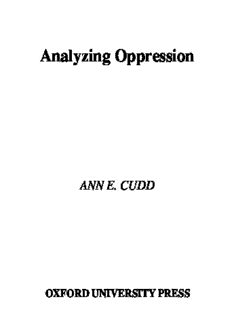Table Of ContentAnalyzing Oppression
ANN E. CUDD
OXFORD UNIVERSITY PRESS
Analyzing Oppression
StudiesinFeministPhilosophyisdesignedtoshowcasecutting-edgemonographsand
collectionsthatdisplaythefullrangeoffeministapproachestophilosophy,thatpush
feminist thought in important new directions, and that display the outstanding
qualityoffeministphilosophicalthought.
STUDIESINFEMINISTPHILOSOPHY
CheshireCalhoun,SeriesEditor
AdvisoryBoard
HarryBrod,TempleUniversity
ClaudiaCard,UniversityofWisconsin
LorraineCode,YorkUniversity,Toronto
KimberleCrenshaw,ColumbiaLawSchool/UCLASchoolofLaw
JaneFlax,HowardUniversity
AnnGarry,CaliforniaStateUniversity,LosAngeles
SallyHaslanger,MassachusettsInstituteofTechnology
AlisonJaggar,UniversityofColorado,Boulder
HelenLongino,UniversityofMinnesota
MariaLugones,SUNYBinghamton
UmaNarayan,VassarCollege
JamesSterba,UniversityofNotreDame
RosemarieTong,UniversityofNorthCarolina,Charlotte
NancyTuana,PennStateUniversity
KarenWarren,MacalesterCollege
IrisMarionYoung,UniversityofChicago
Publishedintheseries:
AbortionandSocialResponsibility:DepolarizingtheDebate
LauriShrage
GenderintheMirror:ConfoundingImagery
DianaTietjensMeyers
Autonomy,Gender,Politics
MarilynFriedman
SettingtheMoralCompass:EssaysbyWomenPhilosophers
EditedbyCheshireCalhoun
BurdenedVirtues:VirtueEthicsforLiberatoryStruggles
LisaTessman
OnFemaleBodyExperience:‘‘ThrowingLikeaGirl’’andOtherEssays
IrisMarionYoung
VisibleIdentities:Race,Gender,andtheSelf
LindaMart´ınAlcoff
WomenandCitizenship
EditedbyMarilynFriedman
AnalyzingOppression
AnnE.Cudd
Analyzing Oppression
ANN E. CUDD
1
2006
1
OxfordUniversityPress,Inc.,publishesworksthatfurther
OxfordUniversity’sobjectiveofexcellence
inresearch,scholarship,andeducation.
Oxford NewYork
Auckland CapeTown DaresSalaam HongKong Karachi
KualaLumpur Madrid Melbourne MexicoCity Nairobi
NewDelhi Shanghai Taipei Toronto
Withofficesin
Argentina Austria Brazil Chile CzechRepublic France Greece
Guatemala Hungary Italy Japan Poland Portugal Singapore
SouthKorea Switzerland Thailand Turkey Ukraine Vietnam
Copyright(cid:1)2006byOxfordUniversityPress,Inc.
PublishedbyOxfordUniversityPress,Inc.
198MadisonAvenue,NewYork,NewYork10016
www.oup.com
OxfordisaregisteredtrademarkofOxfordUniversityPress
Allrightsreserved.Nopartofthispublicationmaybereproduced,
storedinaretrievalsystem,ortransmitted,inanyformorbyanymeans,
electronic,mechanical,photocopying,recording,orotherwise,
withoutthepriorpermissionofOxfordUniversityPress.
LibraryofCongressCataloging-in-PublicationData
Cudd,AnnE.,1959–
Analyzingoppression/AnnE.Cudd.
p. cm.—(Studiesinfeministphilosophy)
Includesbibliographicalreferencesandindex.
ISBN-13978-0-19-518743-4;978-0-19-518744-1(pbk.)
ISBN0-19-518743-1;0-19-518744-X(pbk.)
1. Oppression(Psychology) 2. Socialpsychology. I. Title. II. Series.
HM1256.C832005
303.3'3—dc22 2005049873
9 8 7 6 5 4 3 2 1
PrintedintheUnitedStatesofAmerica
onacid-freepaper
For Neal, with love and gratitude
This page intentionally left blank
Preface
Humanbeingssuffermyriadkindsofharms.Likeallotheranimals,wewitherand
die of disease and injury, in pregnancy and childbirth, and from old age. Like
someotheranimals,wesometimesinflictinjuryanddeathuponeachother.Inthis,
asinmanyotherrespects,ourabilitiesarevastlysuperiortotheotheranimals.Not
onlycanweharmeachotheronebyone,wehavesystematicwaysofunitingtoharm
whole collections of other humans. We wage war, we annihilate, we execute, we
enslave,weretaliate,wepunish,wedominate,weterrorize,wetyrannize,weexploit,
we coerce, andwe oppress. Unlike the other animals,we morally judge our actions
thatharmeachother,justifyingsome,denouncingothers.Thisbookisaboutoneof
thesekinds of harms that we systematically inflict on persons: oppression.
Although ‘‘oppression’’ is a widely used concept, political philosophers, espe-
ciallyintheliberalandanalyticphilosophicaltraditions,haveprovidedlittleinthe
way of careful conceptual analysis of the term. Aside from short articles and books
on specific instances of oppression, there exist no book-length comprehensive,
generalanalysesofoppressionbyanalyticphilosophers,thoughtherearesuchbooks
on related concepts of coercion and exploitation.1 This is not to say that there is
a dearth of literature on oppression. Quite the opposite: Oppression is a common
theme in literature, in memoirs, and in books detailing the history of most of the
human past. The books that have been written about oppression would fill a very
largelibrary,anditwouldbeimpossibleforonepersontoreadthemallinalifetime.
Oppression is both widespread and deeply felt. Books are difficult to write, but
oppression sufficiently motivates many to take on the task, whether to inform, to
indict the oppressors, or to bear witness to suffering.
So how could philosophers avoid theorizing oppression? I would offer a few
reasonsbywayofspeculationonthisquestion.First,philosopherstendnottocome
fromoppressedgroups.Philosophizingisanactivityforwhichonehastohavetime
and space in which one is not pressed by mere physical survival tasks. Oppressed
personstypicallyaresopressed.Whileoneneednotsufferoppressioninordertosee
itortobemotivated towriteaboutit,clearlyithelps.Considerthosephilosophers
viii Preface
who have written about oppression; the majority are Jews, women, members of
colonized nations, or members of racial minorities. Yet these groups, even when
takentogether, formaminorityoftheprofessional philosophersontheplanet,and
especiallyamonganalyticphilosophers.Ifthereisaconnectionbetweenbeingfrom
aminorityorbeingawomanandwritingaboutoppression,asIthinkthereis,then
thiscouldinpartexplainthedearthofworkonit.Second,oppressionraisesstrong
emotions, which philosophers tend to shy away from. No one can write about
oppression without becoming angry, deeply saddened, or perhaps even defensive.
Yettodophilosophyistoapplyone’sreasontothematterathand,inwhatHume
called‘‘acoolhour’’ofthoughtandreflection.Ihavefoundthewritingofthisbook
tobeadeeplyemotionalexperienceattimes,andIhavehadtoputthebookaside
attimestoregainmycomposure.WhileIwouldnotwanttoarguethatphilosophy
cannot orshould not bedonepassionately, itismoredifficult toreason objectively
whenonefeelsgreatemotion.Furthermore,philosopherstendtothinkofpassionas
unseemly for professional work. Since there are a great many fascinating philo-
sophical issues that do not raise this difficulty, many philosophers simply avoid the
issues that do. A third reason for the neglect of oppression is that analytic philos-
ophy has gravitated to the most abstract analyses of human experience, regarding
abstraction itself the hallmark of philosophical thought. Since understanding op-
pression involves considerable empirical exploration, at least much of that work is
considered‘‘notphilosophy.’’Butthisisamistakenprejudice,perhapsevenaratio-
nalizationforlazyarmchairtheorizing.Analyticphilosophersofscienceseemtohave
outgrown their prejudice for empirical work, and it is time that analytic political
philosophersandethicistsdosoaswell.
Amoretheoreticalreasonforthelackofattentionbyanalyticphilosophersisthat
justice has long been the primary concern of political philosophers. Although most
considerinjusticealsoimportant,ithasbeenanabidingprejudiceofpoliticalphilos-
ophers(especiallyintheliberal,Anglo-Americantradition)thatinjusticeissimplythe
negation of justice. John Rawls’s twentieth-century classic Theory of Justice, for in-
stance,leavesinjusticevirtuallyuntheorized.2Thisprejudiceismistaken;justicecan
failinmanydifferentandnuancedways,asthisbookpointsout.
Oneoftherecurringthemesofthisbookconcerns thedifficultyofrecognizing
someformsofinjustice.Considersomehistoricalexamples.Ithasnotalwaysbeeneasy
torecognizethattheconfinementofwomentosocialrolesthatentaillessaccessto
socialresourcesorgreaterburdensintheprovisionofsocialbenefitisunjust.Ithasnot
alwaysbeenrecognizedthatpersonsforcedtoworkfortheirpayatratesdeterminedby
marketforcesnotoftheirownmakingareenslavedunjustly.Itisnoteasytorecognize
thedifferencebetweenjustandunjustwars.Itisnoteasytodeterminewhencom-
pensation is owed for past injustice, or to whom. Without a proper theory of op-
pression,wewillnotbeabletorecognizeinjusticeinallitsforms,however.
I have come to study oppression for reasons that are both personal and theo-
retical.Ihavealwaysseenmyselfasafeministandhavewitnessedandexperienced
the sting of injustice suffered by my sex. But I was a philosopher before I was a
feminist philosopher. My early work was on game theory and philosophy of social
science, but I soon saw how those theories might be applied to questions of femi-
nism and oppression.
Preface ix
Feminists have long recognized the oppression of women but have had a hard
timeconvincingothersthatwomenareoppressed.Oneofthemainmotivationsfor
my work has been to construct a general theory of oppression to demonstrate that
womenareharmedunjustlyinwaysthataresimilartotheunjusttreatmentofother
groupswhoaregenerallyrecognizedasoppressed.Likewise,forthosewhocanreadily
recognizetheoppressionofwomen,butnotothergroups,byshowingthatthereare
deepsimilaritiesinthecasestheycanbeconvincedthatthereisseriousunjustharm
goingonintheseothercasesaswell.
Injustice,sinceitnecessarilycomesatthehandsofotherpersons,issurelyone
ofthemostpainfulformsofharmthatapersoncansuffer.Andsoweshould want
urgentlyto eradicate it.Ishall argue in this book that thefundamental injustice of
social institutions is oppression, and oppression can best be recognized, explained,
andultimatelyeradicatedbythetheories,principles,andmethodsthatunderliethe
liberal and analytic traditions.
Description:Analyzing Oppression presents a new, integrated theory of social oppression, which tackles the fundamental question that no theory of oppression has satisfactorily answered: if there is no natural hierarchy among humans, why are some cases of oppression so persistent? Cudd argues that the explanatio

